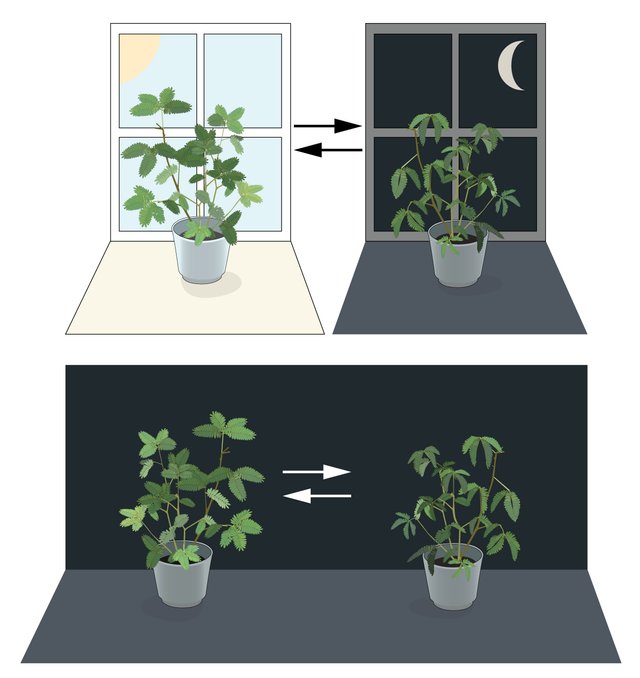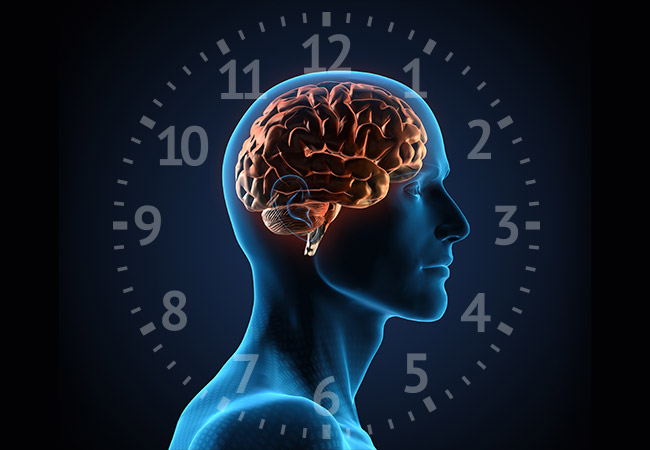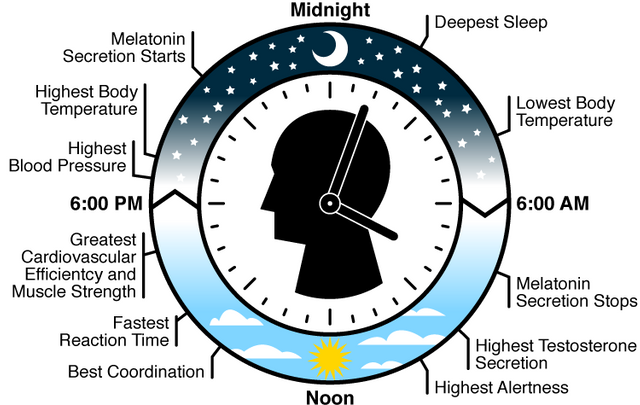The Body Clock – a brief Introduction to the Circadian Rhythm
The Body Clock
The importance of this topic and also the ongoing research carried out in this area is clearly highlighted by the awarding of the Nobel Prize in Physiology or Medicine 2017 to Jeffrey C. Hall, Michael Rosbash and Michael W. Young "for their discoveries of molecular mechanisms controlling the circadian rhythm". - Ref. [2]
Characteristics of the Circadian Rhythm
The Circadian Rhythm acts like an internal clock and allows for periodic changes in behaviour, biochemical reactions and general physiological properties. It is a widespread phenomenon but not universal: e.g. humans, mice, fruit flies, some plants and also some cyanobacteria have daily rhythms, whereas Saccharomyces cerevisiae ("yeast") and Escherischia coli have not. There are three very important characteristics of the rhythm:
- Its innate nature: The rhythm is intrinsic and exists without any sensory input from the environment.
- Its temperature compensation: The rhythm is independent of the external temperature.
- Its photoentrainment: The rhythm synchronizes its phases to the external light-dark cycle of the solar day.

The depicted experiment, was performed with a mimosa plant and showed, that the rhythm continued for several days also under constant dark conditions. - Image taken from Ref. [5]
What is the use of the circadian rhythm?
It serves the optimization of activity thus avoiding predation and competition between different species, allows humans to be most active during daytime, when we can best take advantage of our environment, and also allows phases of rejuvenation at other times.
The following representation shows the idealizied circadian phases of human and mouse activity. This clearly shows that the clocks of diurnal and nocturnal species are in antiphase.
What biological functions are influenced by the circadian clock in humans?
- Sleep-wake cycle
- Neuroendocrine levels
- Mental alertness
- Physical strength (!)
- Body temperature
- Blood pressure and viscosity
The distinct phases of these functions respond to several factors, such as food uptake, emotional stress, ambient temperature and so on. Despite all these other influences, light is the most dominant cue or Zeitgeber. The periodically changing states of the mentioned biological functions can be illustrated very well. (see image below)
Additional information: The hormone Melatonin is produced from Serotonin by the pinealocytes in the pineal gland and controls the sleep-wake rhythm of the human body.
How does the circadian clock tick?
To be able to synchronize the phases of an organism to its environment, there has to be some kind of receptor. Despite the fact, that it was known relatively soon, that light is the dominant timekeeper, the nature of the receptor remained elusive ("cryptic") for a long time. The first so-called blue-light receptor was discovered in the model plant Arabidopsis thaliana and was named Cryptochrome. In humans the important circadian photoreceptors are located in the ganglion cell and inner nuclear layer within our eyes. Although all mammalian cells express cryptochromes, the master clock is located in our brain, or more precisely in the suprachiasmatic nucleus (short: SCN). This region fulfills two fundamental tasks:
- It receives the light signal from the retina, which stimulates the transcription of certain PER genes, which in their turn reset the phase of the rhythm.
- It synchonizes the peripheral clocks through neural an humoral communication to achieve rhythmicity on the organismic level.
The visual and circadian centers in the brain are separated:
The Circadian Rhythm and Human Health
Since roughly 25 percent of all protein switches - they regulate the function of the proteins and thus the metabolic processes - are influenced by this internal clock, the so-called Chronobiology has an enormous impact on human health! - Ref. [3] - To illustrate this, only a few exemplary but easy-to-relate health issues shall be discussed briefly:
Jet lag: This rizes from a desynchronisation of the rhythm by global traveling. Common symptoms include tiredness, irritability, lack of concentration, sleep disorders and gastrointestinal problems. Treatment: melatonin
Seasonal affective disorder: These are symptoms of depression like morbid state of mind or oversleeping caused by a failure to entrain the master clock due to low light intensity during winter.
Familiar advanced sleep phase syndrome: Here the free running period is shorter than the usual 24.3 ± 0.1 hours. Hence indiviuals go to sleep in the early afternoon! Apparently this is related to a mutation in the PER gene.
Light at night or short LAN: The exposure to light during the night may increase the risk of cancer several fold. Especially the risk for breast cancer in women. This is due to the fact, that the Melatonin production is disturbed and this hormon is oncostatic in estrogen-dependent cancers!
Results and implications of the latest research
The discoveries of the Nobel Prize laureates gave an explanation for the continuously oscillating nature of the biological clock. (The timerkeepers only provide for the synchronization but not for the existence of this amazing mechanism!) They found a “period” gene that encodes for the PER protein, which accumulates in cells during the day and degrades at night. So-called TIM proteins from the “timeless” gene interact with the PER proteins when their level becomes too high to repress PER gene activity. This simplified model illustrates the self-regulatory, approximate 24-hour feedback loop essential to the workings of circadian clocks! - Ref. [5]
The findings of the Nobel Prize laureates could also be interesting for drug development. Better knowledge of these rhythms may allow the development of e.g. more efficient sleeping pills. - Ref. [3]
For many medications it makes a difference at what time they are administered - both in terms of their intended effect, as well as the side effects. Researchers are already trying to adapt certain anti-cancer medications to their patients' internal clock. - Ref. [4]
Night and shift work confuses the biological rhythms and can increase the risk of cancer. However, apparently only when day and night work alternate. Interestingly, the negative effects do not occur when night work is done regularly. - Ref. [3]
For all interested readers I warmly recommend Ref. [5], which is an easy to follow article written for those who want to know more about the background of the Nobel Prize 2017 in Physiology or Medicine!
If you enjoyed this article, please consider upvoting, following or resteeming. :)
Best,
mountain.phil28
References:
- Information and non-direct-cited images are taken from
"Molecular Physiology" lectures at the TU Graz. - "The Nobel Prize in Physiology or Medicine 2017". Nobelprize.org. Nobel Media AB 2014. Web. 10 Dec 2017.
- Christa Schimper, Ernst Mauritz: Wie uns die innere Uhr steuert, Kurier Article from 03rd Oct. 2017
- Sarah C.P. Williams: Hacking the biological clock, Stanford Medicine Article
- Nobel Prize 2017 Laureates, Physiology or Medicine, Scientific Background: Discoveries of Molecular Mechanisms Controlling the Circadian Rhythm


This information about receptor sites in the eyes makes me wander about circadian rythms in the blind. I have been noticing through living mostly completely in the nature these past weeks with nothing but my hammock that I am going to bed a waking up much earlier. The sun sets here at 6 and by 7 I finish up eating and by 8 I am ready for bed. We are meant to live with the sun as all of nature has evolved with it's cycles. The indigenous tribe we were living this showed the health of connecting with the sun quite well. At 5 am as the first rays started to crack over the horizon I could hear them starting with wood chopping and from there had a very productive day. I feel that they looked down on us when we would sleep untill 7am as though we were waking up late.
Also thankyou because I just saw you resteemed my last article. It means alot to have the recognition of someone with such thoughtful and well written work. I enjoyed this article and learned alot as always from you.
I really appreciate your comments! They are always very elaborated and encourage further thoughts concering implications of the topic.
Oh, your acting on this platform and also your work is very nice. I enjoy to support you and I am sure, you will have a bright future here amongst us scientifically interested Steemians! :)
Best,
mountain.phil28
So exercise is best during afternoon hours?
Define "night"!
Also, does that mean blue light, or all light? Does using something like f.lux help? Or wearing those orange glasses?
In terms for your maximum performance: yes!
In terms of how much your training will give you progress in defining your body it is hard to tell from this.
With "night" the phase of the day without (high intensity of) natural light is meant.
Blue light is indeed the part of the light, which is the main trigger. ;)
I am pretty sure, both mentioned gadgets/tools should help. Unfortunately I am not able to state, in which extent they help to avoid the interruption of the circadian rhythm.
hello, your post has been featured on the latest Steemstem Distilled issue :) https://steemit.com/steemstem/@steemstem/steemstem-distilled-13
Wow! Great to hear!
I will continue work to provide the community with more interesting posts like this! :)
Best,
mountain.phil28
sweet, me likes :D
hm -Night and shift work often, get depression do to lack of Melatonin, as they sleep at the wrong time and REM dont actually show up as they sleep differently from night snooozers :)
Jet lag can be helped with eating protein during your flight &&& as always-stay hydraited :D
Job way, well done <gives start in DA coner^^
DA coner? :-D
Hi sweets :D💗 he he i have a typo LOL not-start. It was-STAR in DA coner^^
didn't you get them in 1-3 grade? ;) You know, the teacher put a gold star sticker, on your essays when you was best in class ? ;)
Of course I did get those - sometimes. :D hahaha very funny :P
<looks suspicious.. 'sometimes" ??? hellOO your one of the smartest people i at this moment know.. Definition of sometimes..please^^ :P
<knowS^^
Thx. Thats a kind thing to say. Nonetheless people develop and an individual does not have the same intellectual capacities over its' whole life. ;) So really "sometimes" like it is normally understood. ;)
They do??wow O.o noo, your pulling my leg watson... I hade noo clue ;) :P LOL
A very cute and correct response dear :D💗 Noo, your not getting a second staR ^^ ;0
<tinkz we are so soo of topic here LOL
Nice content and interesting to read.
off-topic: noch ein österreichischer Chemiker... yay. ;-)
Hi!
Thx!
Haha, dass is nice! Studierst du noch Chemie oder bist schon am arbeiten? :-)
Best,
mountain.phil28
Ich bin schon länger fertig, und arbeite als Wissenschaftler in Wien. Du?
Dein Profilbild deutet irgendwie auf Innsbruck als Studienort hin...
Wow sehr beeindruckend, dass du das erkennst!
Da war ich wandern in Tirol.^^ Aber ich studiere in Graz. ;-)
Na ja, ich bin ursprünglich Tiroler^^
Ich werd dir folgen, dann lesen wir sicher noch öfter voneinander.
Umgekehrt das selbe. ;-)
Excellent, it would be interesting to study the melatonin levels of veteran touring musicians.
What a neat idea! :D
This post has received a 7.9 % upvote from @boomerang thanks to: @roused
@boomerang distributes 100% of the SBD and up to 80% of the Curation Rewards to STEEM POWER Delegators. If you want to bid for votes or want to delegate SP please read the @boomerang whitepaper.